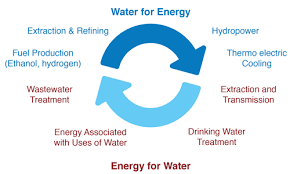Modern systems of water and energy are tightly intertwined. Significant amounts of water are expended during the phases of energy production, from resource extraction to final generation. In turn, energy powers the equipment that extracts groundwater or surface water, purifies water to the  standards required for human consumption, pumps water to our communities and businesses, and finally treats wastewater before releasing it to the environment. That relationship was the focus of a joint meeting held here at Marquette University earlier this month between The Water Council and the Mid-west Energy Research Consortium. The two organizations plan to design a joint roadmap to advance local efforts, including academic research, in the “energy-water nexus.”
standards required for human consumption, pumps water to our communities and businesses, and finally treats wastewater before releasing it to the environment. That relationship was the focus of a joint meeting held here at Marquette University earlier this month between The Water Council and the Mid-west Energy Research Consortium. The two organizations plan to design a joint roadmap to advance local efforts, including academic research, in the “energy-water nexus.”
To date, significantly less attention has been paid to the legal and policy aspects of this “nexus.” Policy strategies surrounding the “nexus” have generally focused on efficiency measures to limit demand for both water and energy, especially in sectors that use both such as agriculture and power generation. More innovation solutions might include sustainability index measurements, pricing corrections, and alternative decisional frameworks that include broader groups of stakeholders.
The conceptual “nexus” model is not without its critics, however.
Some observers have argued that the spectrum of elements making up the “nexus” isn’t broad enough. A recent United Nations report took the position that the “nexus” should include consideration of food production technologies and policies, because agriculture – especially when made possible by irrigation – often requires copious amounts of both water and energy. Still others make the case, as in a recent World Economic Forum report, that those studying the “nexus” should also consider climate effects on water supplies, food production, and energy demand. Related resources such as forests could also be included, although at some point overextension of the study area could render it nearly all-encompassing and reduce its utility as a thought paradigm.
Alternatively, some economists have argued that the water and energy resource systems should be separately managed; or more specifically, that the “nexus” would not exist if resource prices were appropriately adjusted for scarcity and externalities. At least with respect to water prices, that doesn’t seem likely anytime soon.
Sound management of these resources calls for an integrated, cross-disciplinary, and strategic approach. Milwaukee’s efforts to position itself as a world water hub make it an ideal location to explore these issues, as the Water Council and M-WERC – and Marquette – are poised to do.

An inherent aspect of the “energy-water” nexus is conservation, which goes beyond a goal of efficient use of water. It means development of truly sustainable energy sources, and “conservative” land use, including resistance to sprawl. The Great Lakes Water Compact and institutions like the UWM School of Freshwater Sciences, and others, are essential parts of the conversation about Wisconsin inland waters and the Great Lakes. I look forward to a broad-based, forward-looking conversation at Marquette University that involves all the stakeholders.